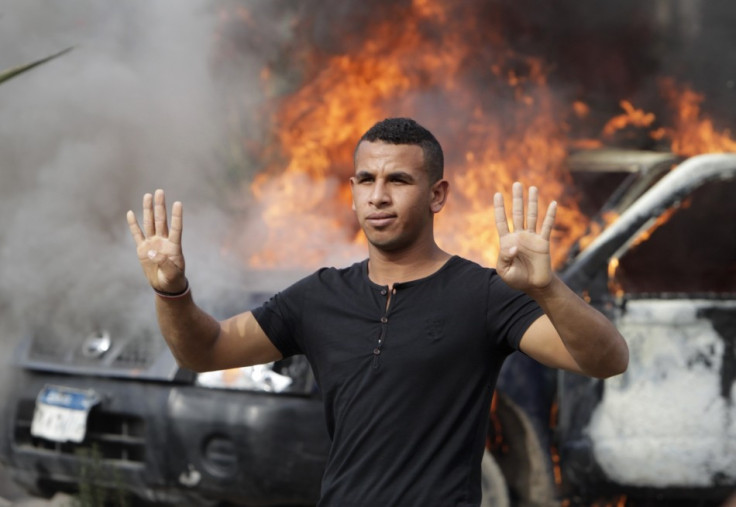Egyptian Experience Shows we Cannot Lock up Ideas
Egypt in danger of repeating old mistakes by classifying Muslim Brotherhood as terrorists

The New Year for the Muslim Brothers in Egypt has got off to a bad start.
In 2013 the Muslim Brotherhood was hailed as the moderate answer to Islamist politics and the Islamist political group most closely associated with the country's leadership. The Brotherhood-affiliated President Mohamed Morsi boasted Time's Person of the Year runner-up in 2012 as the Middle East's most influential figure.
Today, a deposed Morsi faces trial in an Egyptian prison cell, along with many of the organisation's top leadership figures, no longer as the ousted President of the Republic of Egypt and the top leaders of a reformist Islamist organisation and political party, but as members of a terrorist organisation.

Two weeks ago the military-backed interim government made the decisive move to brand Egypt's largest and oldest Islamist group a terrorist organisation, criminalising all its activities, its funding and its membership. For many, it evokes memories of the 1990s as Egypt plundered into a deadly series of terrorist attacks. Though even in the 1990s, the Muslim Brothers were not the bad guys - that mantle was reserved for the likes of al-Gama'a al Islamiyya, the perpetrators of the Luxor massacre, and Ayman al-Zawahiri's Egyptian Islamic Jihad.
In fact, the Egyptian Muslim Brotherhood officially renounced violence in the 1970s, a decision that made it often unpopular by members of other more extreme jihadist factions. Throughout the 1990s, the organisation was widely used under the Mubarak regime as a mediator between the state and the violently radicalised groups responsible for the attacks.
Despite this knowledge, the justification for the Brotherhood's terrorist label follows a recent attack on a police station in Mansoura, north east of Cairo, where according to media reports, 15 people were killed from the explosion. While the Brotherhood continues to deny their involvement in the attack, and despite a confession from the al-Qaida-inspired Ansar Beit al-Maqdis for the attack, the interim government persists in blaming the Brotherhood.
Repression and imprisonment has shown to not only cause a wave of radical thought within prisons, but also on the streets, among those sympathetic to the Islamist cause
The need to attach responsibility of a terror attack on the Brotherhood is obvious in order to label it a terrorist organisation, and in doing so, the authorities have gained greater leverage to crackdown on the Brotherhood.
However this method could backfire, leading to the potential influx of violent radicalisation among Brotherhood and other Islamist sympathisers. Historically, repression and imprisonment of such individuals have shown to not only cause a wave of radical thought within prisons, but also on the streets, among those sympathetic to the Islamist cause.
The last significant crackdown on the Brotherhood occurred under President Gamal Abdel Nasser in the 1950s and 60s, following the Brotherhood's brief involvement in political assassinations. Nasser's counter-terrorism tactics caused splinter groups to form as members broke away from the Brotherhood to form more radical offshoots, some of whom later waged ongoing transnational jihad under the banner of al-Qaida.
There is no doubt that Nasser's repressive policies toward Islamist activists had repercussions that still manifest today. The greatest known prisoner of his time was Islamist theorist and leading member of the Egyptian Muslim Brotherhood, Sayyid Qutb, today recognised as the man who "launched a thousand suicide bombers".
His execution, perceived as martyrdom, at the hands of the state; and his radicalisation, recorded and theorised during his years in an Egyptian prison cell, went on to spearhead Islamists from all backgrounds. His musings are still referred to today, interpreted by many Islamists to justify violence in the face of oppression.
If history has anything to teach us, it is that repressing and forcing politically -motivated groups underground can lead to the justification among some of its members for the adoption of more violent tactics.
While it is unlikely that the Brotherhood's official stance on violence will change, the Brotherhood suffers from ongoing internal splits and it is understood that this is both generational and ideological. These splits are most likely to manifest themselves at a time of great pressure and loss of central command.
The Brotherhood's popularity among Egyptians has no doubt diminished since the failures of the Morsi presidency, and it is this widespread distrust of the organisation that the military-backed interim government appears to be optimising. While its reception for an appeal may be limited at home, the Brotherhood has sought justice outside of Egypt, filing a complaint with the International Criminal Court (ICC). It does, however, face an uphill struggle as Egypt is not a signatory to the ICC, therefore preventing the court from intervening without the government's official consent.
One cannot lock up ideas. Violent ideology feeds on perceived tyranny and injustice. In this way, Egypt should learn from its history: that criminalising legitimate opposition, however unsavoury, will lead to further radicalisation. Non-violent extremism must be challenged and its ideas exposed for their moral and intellectual bankruptcy.
Perhaps the words of Qutb would not have proved so popular today, were his torture and suffering at the hands of a tyrannical regime not so relatable to so many young, 21<sup>st Century activists. A human rights-based approach that wins the battle of ideas is the only solution.
Emman El-Badawy is a Middle East analyst at Quilliam, a counter-extremism thinktank. Visit the website for more information
© Copyright IBTimes 2025. All rights reserved.





















